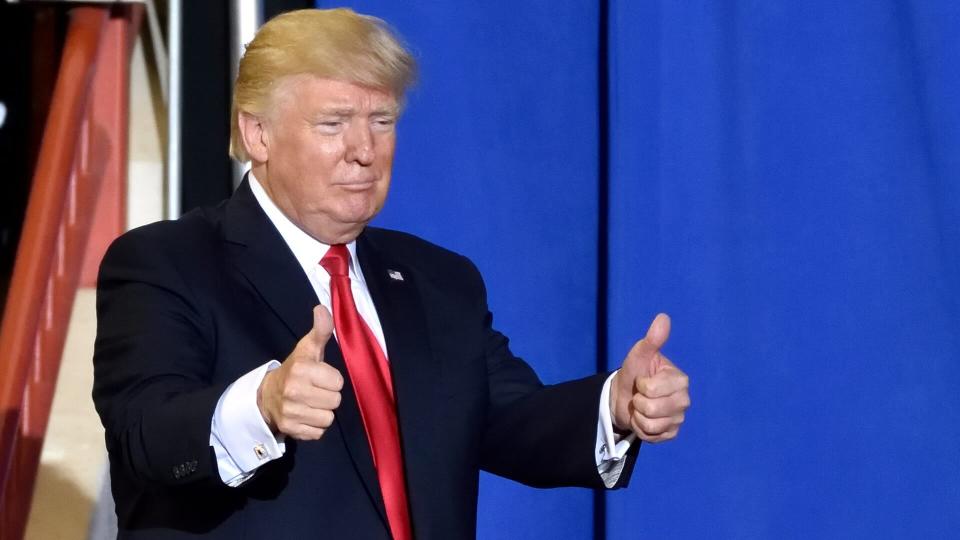I’m an Economist: Here Are My Predictions for Inflation If Trump Wins

The 2024 election will be here before you know it, and economists are watching it closely.
If Donald Trump wins a second term, some experts believe it could affect the U.S.’s inflation trajectory — that a second Trump term would mean higher tariffs, deficits and other policies that would increase inflation. While forecasting economic conditions isn’t an exact science, experts can speculate using knowledge about the past and some clues about the future.
Learn More: How Obama, Biden and Other Elected Officials Have Made Millions by Being in Office
Find Out: How To Get $340 Per Year in Cash Back on Gas and Other Things You Already Buy
A new report from Allianz Research provides insights into how inflation could unfold under a Trump 2.0 presidency. The report shows that while some policies could increase inflation in the short-term, the overall inflation path would be shaped by factors like the Federal Reserve’s actions and broader economic conditions.
GOBankingRates spoke to Maxime Darmet, senior U.S. economist at Allianz Trade, who co-authored a recent report by Allianz Trade research, titled “Trumponomics: the Sequel” on this very subject.
Let’s dig a little deeper into what inflation might look like in a second Trump term:
Wealthy people know the best money secrets. Learn how to copy them.
A Tough Inflation Battle Ahead
The next president has their work cut out for them when dealing with inflation. The U.S. economy has been pretty sturdy lately, despite interest rates climbing.
“While the U.S. has remained remarkably resilient despite rising interest rates and global uncertainty, it has become more prone to inflation volatility, given a larger exposure to frequent supply shocks and structural labor shortages,” Darmet said. “Against this backdrop, demand-boosting policies — such as tax cuts — or supply-hurting policies — such as tariff hikes — could re-ignite inflation faster and push up interest rates.”
Whoever takes the Oval Office in 2025 should tread carefully with their economic plans. Big tax cuts might sound great at first — they put more cash in your wallet. But if there are limited goods to spend that money on, it easily overheats the economy and spirals inflation even higher.
A Potential Trade War
If Trump does end up back in the White House, it seems likely that he would double down on protectionist policies to boost U.S. manufacturing. He has proposed tariff increases, including 10% on all imports and 60% on Chinese goods.
The Allianz report discusses two potential scenarios — one in which the U.S. tariff rate rises from 2.5% up to 4.3%. However, another scenario, in which Trump implements all the tariffs he has threatened, could push the rate to around 12%.
“However, in both cases, we would expect Trump to target goods that are not critical for the U.S. economy, equivalent to 55% of imported Chinese goods and 70% of EU goods,” Darmet wrote. “China’s textiles sector and the U.S. transportation equipment sector would be the hardest hit.”
So maybe cars and electronics stay relatively unscathed, while China’s clothing exporters take the brunt. But even with that targeted approach, the consensus is that it will act as a dreaded inflation bomb. In this case, the report predicts inflation could increase by 0.6 percentage points.
Trending Now: I’m an Economist: Here Are My Predictions for Inflation If Biden Wins Again
Fiscal Tension
Of course, Trump wouldn’t exactly be working with a fresh economic slate if he retakes the White House. He’d be inheriting the budget situation from Biden’s term.
“A Trump 2.0 presidency would inherit very large fiscal deficits from the Biden administration and rising interest expenses,” Darmet wrote.
Trump’s bold promises of slashing taxes and ramping up spending could quickly run into some harsh fiscal realities. He’ll have to perform some nifty accounting tricks to pull off his economic vision without sending bond market investors into a total panic over the stability of America’s finances. One potential gambit would be to hike all those tariffs and trade taxes to fund the tax cut promises while scaling back Biden’s pricier policy initiatives.
So unless the Trump 2.0 economy is some world-beater of growth, most forecasters see the new administration ultimately having to pump the brakes on fiscal loosening after maybe a year of smaller tax cuts or spending bumps.
Otherwise, the whole economic agenda could wind up crumbling under the weight of unsustainable budgets and debt — something that fiscal conservatives in Trump’s party would likely refuse to accept. That deficit dynamic keeps economic advisors up at night as they game-plan Trump’s potential second term.
Push for Domestic Production
Trump has said a goal is to ramp up U.S. manufacturing and reduce foreign manufacturing relationships. However, the report suggests that such policies need to be carefully designed.
“In order to yield benefits, industrial policy must avoid the risk of targeting too many objectives. In that respect, Trump’s ambitious Strategic National Manufacturing Initiative (SNMI) may disappoint when set against its numerous goals and the reality that the U.S. does not have a competitive advantage in many sectors,” Darmet wrote.
Fed’s Inflation Balancing Act
The Fed’s response would shape inflation under a second Trump term.
“Against this backdrop, we would expect the Federal Reserve to be forced to pause its easing cycle in 2025 and the U.S. 10-year yield to stay above 4%,” Darmet wrote.
This could control inflation but weigh on growth and markets initially. The report highlights the delicate balance the Fed would face between inflation and economic impacts.
More From GOBankingRates
I'm a Shopping Expert: 6 Things Retirees Should Never Put In Their Grocery Cart
6 Things to Try This Week if You're Behind on Your Savings Goals
4 Reasons Retired Women Need More Money Than Men -- And What To Do About it
This article originally appeared on GOBankingRates.com: I’m an Economist: Here Are My Predictions for Inflation If Trump Wins

 Yahoo Finance
Yahoo Finance 